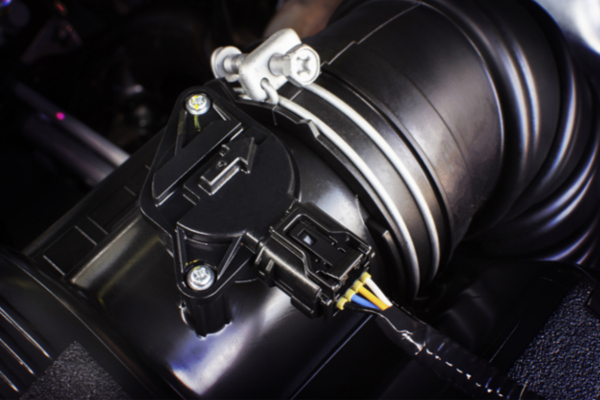
The exhaust system then diverts any harmful gas away from the engine and out of the vehicle. Damage to the air intake system may create hazardous driving conditions.
How the Air Intake System Works
A cold-air intake tube brings in air from outside the engine bay, which then goes through the “air box” and engine filter, designed to catch contaminants that could clog or place a greater wear on the engine.
On average, these air filters should be replaced once or twice a year. If you regularly travel on dirt or gravel roads, you may need to change them more frequently.
The rest of your air intake system consists of the following functions:
- The engine control module (ECM) works with a mass air flow meter (MAF) or manifold absolute pressure (MAP) sensor to observe the amount of air coming through the filter. An electrical current indicates how much air is passing through.
- Throttle body controls the airflow within the engine.
- The idle air control (IAC) valve or electronic throttle control (ETC) allows a small amount of air to keep the engine going when you stop at a light or travel at a low speed.
- The intake manifold consists of a series of tubes that deliver the air from the air intake system to each cylinder in your engine. Depending on engine type, length and routes vary, but this function helps make the airflow more efficient.
- Intake valves are what the air passes through before arriving at the cylinders. The intake valve opens so the cylinder can draw in air right as the piston presses down. Once the intake valve closes, the piston is able to compress the air.
- The pipes within your air intake system need to be leak-free and have strong seals and connections. Otherwise, dirt and debris can enter the engine from the outside.
Air Intake System Issues
As the most common issue with your air intake system, dirt and other debris accumulate on the valves and ports, as well as your engine’s fuel injectors and combustion chambers. Over time, the buildup impacts its performance, affecting how much power it receives and may result in random stops, misfires, pinging and knocking.
To address these issues and prevent leaks, the technicians at DaSilva’s Auto Body may:
- Replace the parts within your engine’s air intake system.
- Clean the throttle body, air intake valves and ports, and the fuel injectors.
- Remove any deposits that have formed within the combustion chambers.
- Balance the fuel-to-air ratio for optimal performance, fewer emissions, better fuel economy, less noise and consistent starting.
The check engine light is the often first indication something is wrong with the air intake system. Let us diagnose the issue and perform any necessary repairs. Make an appointment today!

